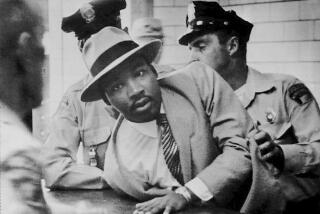Challenging Biblical Assumptions : Book: Gospel researcher offers some radical notions in self-published work. Despite his amateur status, it has drawn praise from many scholars.
After spending years selling sophisticated computer systems, Evan Powell is marketing something he believes is every bit as revolutionary: His own findings in Gospel research.
His conclusions challenge long-held assumptions about which gospel was written first, and even the authorship of portions of the Gospels, with consequences for understanding early Christianity.
Powell, 41, self-published his first book, “The Unfinished Gospel: Notes on the Quest for the Historical Jesus” in May, and it has been in bookstores since Oct 1. Praised by some biblical scholars despite Powell’s amateur status, the first printing of 3,000 has sold out and a second printing of 10,000 is in bookstores.
The book is one of a recent spate of works that attempt to dig behind the Gospels to establish a historical Jesus, including a book by a coalition of American Bible scholars which concluded that Jesus said only 18% of what has been attributed to him in the Gospels.
But unlike those books, many of which were published by major houses, Powell’s is the fruit of his own determination.
The Lake Sherwood resident is a salesman through and through, and that expertise enabled him to do something almost unheard of for a novice author with a self-published hardback book: He cut a deal with a major distributor. National bookstore chains are carrying the book, and it will be distributed in four English-speaking foreign countries.
The selling point? His conclusions.
Many biblical scholars have long thought that the gospel of Mark lacks a coherent ending, and that there may have been a final chapter, lost centuries ago. Powell contends it wasn’t lost at all, but was taken off the Gospel of Mark and moved to the Gospel of John, where it is known today as John 21, a curious last chapter that has long been considered awkward and redundant where it is.
Sometime during the First Century, the ending of Mark’s gospel was appended to John’s for political reasons within the church, Powell believes.
“The gospel of John was written to demonstrate that Peter was not to be trusted as a leader of the church,” Powell said. “I believe Mark was written as a rebuttal to John. In their original form, these gospels are quite at odds.”
John 21 describes an encounter between Jesus and Peter, one of the original apostles, after the Resurrection. Jesus forgives Peter and tells him to take an active role--in the leadership of the church, an admonition that Catholics believe made Peter the first pope.
*
Powell believes the chapter was shifted from one author to the other to weaken John’s criticism of Peter.
“Adding the last chapter to John has the effect of neutralizing the attack on Peter,” Powell said.
In addition, Powell offers a second radical notion: That John wrote the first gospel. Most scholars believe it was the last of the four, written near the end of the First Century.
If John were written closer to Jesus’ life than were the other gospels, “then the attacks on Peter take on more authenticity,” Powell said. “There is greater potential that John was written by eyewitnesses to events.”
Leading biblical scholars might be slow to warm up to Powell’s conclusions. The author, after all, has no formal religious training, despite a lifelong interest in the Bible.
“His ideas are very attractive at first glance; they make you stop and think,” said Ronald F. Hock, a professor of religion at USC who has read “The Unfinished Gospel.”
“What is needed now is a very careful analysis of what he has proposed, especially the lost ending to Mark.”
Powell also offers a radical notion in explaining the Resurrection. He believes that Jesus did not die during the crucifixion, but went through a “near death experience” and lived several days until he died of the wounds.
Suggesting that Jesus experienced the same near-death or NDE feelings described by many modern survivors--who frequently say they returned from a spiritual realm of incredible tranquillity--helped Powell resolve a contradiction that had troubled him since his early 20s when he contemplated entering the Presbyterian ministry.
“Jesus spent his life trying to re-establish the tradition of Judaism in a way that was less institutional and political,” Powell said. “How does the movement of a religious reformer suddenly transform itself into a movement expounding salvation and eternal life? Those two things just do not connect.
“NDE provides the spiritual element that changed Jesus’ reformist movement into a spiritual movement.”
Powell’s marketing instincts told him to avoid mention of his theory of Jesus’ survival on the book jacket and in advertising.
*
“When it is separated from the context of the book, saying that Jesus survived the crucifixion comes across as sensationalistic,” he said.
“The Unfinished Gospel,” despite its radical offerings, is anything but shrill. Powell wrote it with the lay reader in mind, but his arguments are consistent with historical-literary critical methods, knowledgeable readers say.
Powell established an 800 number to his home in Westlake Village for book sales and has bought print advertisements. And rather than holding his breath worrying how the book will be received by biblical scholars, he actively solicited reviews, mailing more than 200 copies to religion writers and book reviewers nationwide.
Early reviews are in, and they are encouraging. Samples:
* “Powell is an original thinker. There is something here to challenge or offend virtually every reader. Not a book for the fainthearted, “The Unfinished Gospel” is an open invitation to debate over vital issues in the life of Jesus.”--R. Alan Culpepper, Baylor University.
* “Powell’s thesis is clear, complete and convincing. His argument is provocative . . . challenging scholars to rethink views that have for too long been taken for granted.”--Hock.
* “Powell has proposed solutions which demand to be taken seriously. I like his boldness and applaud his work.”--Robert McKenzie, San Francisco Theological Seminary.
*
Powell, who used personal funds to publish the book after spending two years writing it, has come to like the Jesus he describes.
“He was a charismatic individual, brave, willing to challenge authority,” Powell said. “He inspired people to follow him and he put his life on the line for what he believed.”
More to Read
Sign up for Essential California
The most important California stories and recommendations in your inbox every morning.
You may occasionally receive promotional content from the Los Angeles Times.











